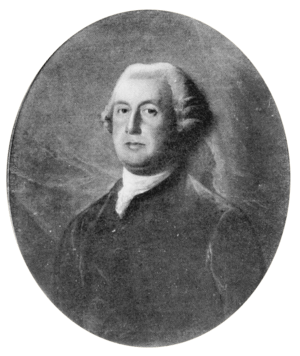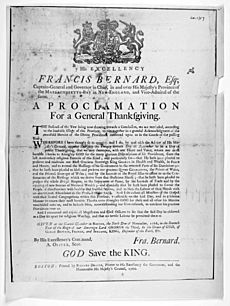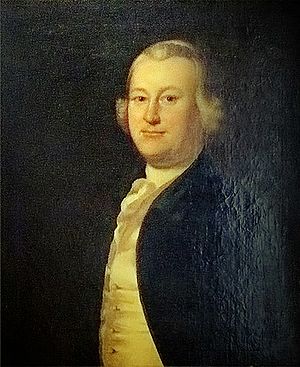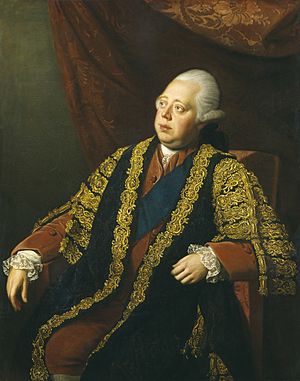Sir Francis Bernard, 1st Baronet facts for kids
Quick facts for kids
Sir Francis Bernard, Bt
|
|
|---|---|
 |
|
| 10º Governor of the Province of New Jersey | |
| In office 27 January 1758 – 4 July 1760 |
|
| Monarch | George II |
| Preceded by | John Reading |
| Succeeded by | Thomas Boone |
| 11th Governor of the Province of Massachusetts Bay | |
| In office 2 August 1760 – 1 August 1769 |
|
| Monarch | |
| Preceded by | Thomas Hutchinson (acting) |
| Succeeded by | Thomas Hutchinson (acting) |
| Personal details | |
| Born | baptised 12 July 1712 Brightwell-cum-Sotwell, Berkshire, England |
| Died | 16 June 1779 (aged 66) Nether Winchendon, Buckinghamshire, England |
| Signature | |
Sir Francis Bernard, 1st Baronet (born 12 July 1712 – died 16 June 1779) was a British leader in the American colonies. He served as the governor of New Jersey and later Massachusetts Bay.
In Massachusetts, his decisions made many colonists angry. His actions helped create strong opposition to British rule, leading up to the American Revolution.
He became governor of New Jersey in 1758. He worked well with the local government there. In 1760, he became governor of Massachusetts. Here, his relationship with the local assembly was very difficult. His responses to protests against new British taxes made things worse. After protests against the Townshend Acts in 1768, Bernard asked for British soldiers to be sent to Boston. He was later called back to England. This happened after letters he wrote, criticizing the colony, were made public.
After returning to England, he continued to advise the British government. He suggested strict actions for Massachusetts. These events eventually led to the 1773 Boston Tea Party. He had a stroke in 1771 and passed away in 1779.
Contents
Early Life and Education
Francis Bernard was born in Brightwell-cum-Sotwell, England. He was christened on 12 July 1712. His father died when Francis was three. His mother passed away from smallpox in 1718. He was likely raised by an aunt for some years.
Bernard started school at Westminster in 1725. He then studied for seven years at Oxford University. He earned a master's degree in 1736. He studied law and became a lawyer in 1737. He practiced law in Lincoln.
In Lincoln, he met the Pownall family. One son, John, worked for the British government in charge of colonies. Another son, Thomas, became governor of Massachusetts in 1757.
Bernard married Amelia Offley in December 1741. They had eight children. He needed more money to support his large family. So, he decided to look for a job in the colonies.
Governor of New Jersey (1758-1760)

Bernard's wife was a cousin of Lord Barrington. Lord Barrington was an important government official. Through these connections, Bernard became governor of New Jersey on 27 January 1758.
He arrived in New Jersey on 14 June 1758. At this time, the colonies were fighting in the French and Indian War. Bernard worked well with New Jersey's assembly. He convinced them to provide soldiers and money for the war.
He signed the Treaty of Easton. This agreement was between New Jersey, Pennsylvania, and Native American tribes. It set clear borders between colonial and Native lands. This helped reduce attacks on the frontier. It also allowed more soldiers to fight against New France. This treaty and others helped end all Native American land claims in New Jersey. It also led to the first formal Native American reservation, Brotherton.
Governor of Massachusetts (1760-1769)

Thanks to his connections, Bernard was appointed governor of Province of Massachusetts Bay in late 1759. He arrived in Boston on 2 August 1760. His time in Massachusetts was very challenging.
Bernard tried to strictly enforce the Navigation Acts. These laws controlled colonial trade. Crown officials, including the governor, received money from ships caught breaking these laws. Cases about these seizures were heard in special courts without juries. This made them very unpopular.
Bernard also upset James Otis Jr.. He appointed Thomas Hutchinson as chief justice. This job had been promised to Otis's father by earlier governors. James Otis Jr. resigned his job as the Crown's lawyer. He then defended merchants whose ships were seized. These early actions created two sides: the "popular party" (like the Otises) who opposed British policies, and the "court party" (like Hutchinson) who supported them.
Things got worse when King George II died in 1760. This meant that "writs of assistance" had to be reissued. These were like open-ended search warrants. They allowed customs officers to search anywhere for smuggled goods. These writs were very unpopular. Hutchinson approved them, which made him disliked. Otis argued they violated the Rights of Englishmen, making him more popular. He was elected to the colonial legislature in 1761. There, he continued to speak out against Bernard's policies.
O B[ernard]! Great thy Villainy has been!
Schem'd to destroy our Liberty and Peace:
The publick Eye attentively has seen
Thy base Endeavours, and has watch'd our Ease
Bernard's unpopularity grew with other tax laws. These included the Sugar Act (1763) and the Stamp Act (1765). The Stamp Act led to riots in the streets. It united many groups against the governor.
In 1767, Parliament passed the Townshend Acts. These taxes caused more protests. The Massachusetts assembly sent a "circular letter" to other colonies. It asked them to boycott goods with these new taxes. In April 1768, Bernard was ordered to dissolve the assembly if they didn't take back the letter. The assembly refused, so Bernard closed it in July.
Bernard's letters to London made British officials think the situation was worse than it was. He suggested that troops were needed to control Boston. In October 1768, four thousand British soldiers arrived in Boston. This made tensions even higher.
Bernard was heavily criticized in the local newspapers. They accused him of writing letters that misrepresented the situation. He refused to release these letters. However, people who opposed him in London got some of his letters. They were published in Boston in April 1769. One letter, in particular, caused great anger. In it, Bernard suggested changing Massachusetts's rules to give the governor more power. The assembly formally asked for him to be removed from his job.
He was called back to England. Lieutenant Governor Hutchinson became acting governor. When Bernard left Boston on 1 August, the town celebrated. They decorated the Liberty Tree and rang church bells.
During his time in Massachusetts, Bernard helped design Harvard Hall at Harvard University. He also built a summer home in Jamaica Plain.
Return to England and Later Life

When Bernard returned to England, he asked for a hearing about the colonists' complaints against him. In February 1770, the Privy Council (a group of advisors to the King) dismissed all charges against him.
Despite this, Bernard resigned as governor in 1771. He was confirmed as the owner of Mount Desert Island. He had been promised a special title, a baronetcy, and a pension. The pension was first reduced but later increased. He also received a job as a commissioner for the Board of Revenue for Ireland.
Bernard became an advisor to Prime Minister Lord North on colonial matters. He often suggested tougher actions than others. For example, he proposed ideas that became part of the 1774 Massachusetts Government Act. This law greatly limited the colonists' political power. It suggested that the governor, not the assembly, should appoint the council.
In 1774, after the Boston Tea Party, Bernard published a book called Select Letters on Trade and Government. In it, he shared his ideas on how to deal with the problems in the colonies. He suggested that American representatives could join the British Parliament. Some of his ideas, like those in the Massachusetts Government Act, were put into law. The anger in London even led to the Boston Port Act, which closed Boston's port.
Decline and Death
In late 1771, Bernard inherited a manor at Nether Winchendon. The stress of this and other family matters caused him to have a stroke. His movement was affected, but he recovered somewhat after visiting Bath. He resigned from his Irish job in 1774, and his pension was restored.
In 1772, he traveled to Oxford. He received an honorary law degree from his old university. Due to his health, he moved to a smaller house in Aylesbury later that year. He passed away on 16 June 1779, at Nether Winchendon, after an epileptic seizure. He is buried in St Mary's churchyard, Aylesbury.
Legacy and Impact
Bernard believed his problems in Massachusetts were not personal. He blamed them on the policies from London that he had to enforce. John Adams wrote that Bernard's negative reports about Massachusetts helped turn British leaders against the colonists.
After the American Revolutionary War began, Bernard's name was on a list of "conspirators against the government." Most of his property in Massachusetts was taken. However, his son John, who supported the American side, was able to keep half of Mount Desert Island.
Several places are named after him. The town of Bernardston in New Jersey was formally recognized in 1760. This area later became Bernards Township. Vealtown, New Jersey was renamed Bernardsville in his honor in 1840. Bernardston, Massachusetts was also named for him. Bernard also named Berkshire County, Massachusetts (after his home county) and Pittsfield, Massachusetts (after British Prime Minister William Pitt).
Images for kids
 | Anna J. Cooper |
 | Mary McLeod Bethune |
 | Lillie Mae Bradford |

